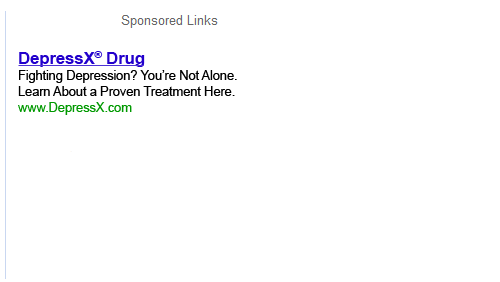With a week or so of fallout from the FDA warning letters sent to 14 major pharmaceutical companies, online marketing firms are still working hard to sort out what this means in practical terms for search engine marketing.
Many of us have sat through Pharma television ads positioning happy, positive messages (sometimes awkwardly) with a long list of side effects and complications. The television ads manage to present core branding and product points while also meeting stringent regulations for providing thorough risk information about the medication being advertised. Like most online marketers, we hope after viewing a medication relevant to a personal health problem, a television viewer will search online for the medication to glean more information, use online tools to help determine if the medication is appropriate for them, and possibly take advantage of savings offers provided by Pharma web sites.
However, with the new FDA warning specifically calling into question sponsored links in paid search, search marketers’ ability to perform their jobs at a high level has seriously diminished. The use of reminder or non-branded ads can lead to lower click-through-rates as well as lower conversion rates for Pharma manufacturers’ web sites. Our internal search experts are already seeing this trend. Removing ad copy that clearly states the purpose or benefit of the medication leaves both consumers and marketers in a somewhat bad situation. The consumer is not clearly informed about what the drug is for or can do. They also don’t have the opportunity to view cost savings offers upfront. The marketer is not allowed to be his or her best self by providing the most conversion effective and highly branded ad copy. So, although the FDA’s point is to protect consumers, they are somewhat providing a disservice to a national consumer market becoming increasingly search savvy day after day. Another tough matter is the fact that other Pharma resellers and outlets don’t have to follow these stricter regulations. Therefore, a Pharma manufacturer’s ad will remain generic and uninformative, while a reseller can provide clear information about what the drug is for, as well as a nice, compelling offer.
When we heard about the 14 warning letters, we contacted our very friendly and responsive Google search reps. We wanted to hear the official “Google line” on the situation and see what solutions they could recommend. Unfortunately, Google took a hands-off approach, letting us know that they had nothing to do with the FDA regulations and had no solutions. They stated that the responsibility would fall to each Pharma company to sort out what paid search ad copy they would feel comfortable running according to their own response to the regulatory news. We were kind of surprised as Google could stand to lose a lot of revenue from rules that hamper search engine marketing in the Pharma sector. Also, Google is generally known for their intense and brilliant problem-solving, not for ignoring a nagging marketing or usability problem.
If We Were Google, What Would We Do?
We put our heads together internally to think through what we might do if we were working at Google. Is it appropriate for Google to provide a special technology for one industry that is struggling with meeting FDA regs in their medium? Yes! We think it’s in the best interest of the consumer, search engines, and Pharma industry for Google to provide a simple solution to the problem of providing succinct, descriptive, branded sponsor link ads with full warning information. If we were Google, we would add a feature in Google Adwords that would allow for search marketers to add the full warning information in the GAWs backend.
When a user mouses over the sponsored ad, the warning information would appear in a fly-over box (scrolling if possible) before the user selects the ad. This way, the user can clearly see the medication’s use and offer, and then be apprised of all warning information before even clicking on the ad. Here’s what the solution might look like:

Searchers learn extremely quickly and would soon catch on. As with Pharma television ads, the positive message is allowed to breathe while the extremely important risk and warning information is offered simultaneously. This meets everyone’s needs and provides a richer, smarter way to solve the problem.
Comments(1)1 Comment »
Leave a comment
Web Ad.vantage is a full-service online marketing company with core competencies in search engine optimization, PPC Campaign Management and online media buying. Visit our Internet Marketing Services section to learn more about our full range of services.
WebAdvantage.net encourages the reprinting of our marketing tips and articles. Before doing so, however, please contact us at for permission to do so. The company bio located above is required to accompany any reprint. Thank you in advance for your professional courtesy.
Pragmatic, professional advice with no hidden agenda.

Internet Business Forum






 back to top
back to top







Pharma companies should flat out not be allowed to use this medium. We all know how long it takes people on the commercials to spit out all the risks, there is no possible way a Pharma company can grab your attention, promote the drug AND give all the risks in two 35-character long lines.
Eric T. @ Pharmaceutical Industry abroad.
Comment by Eric T. — June 16, 2009 @ 10:33 am